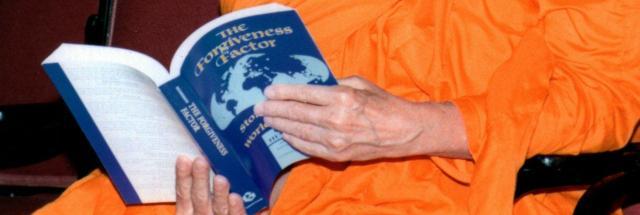KBOO 19 March 1987
A scant mile from the devastated ‘green line’, the road to Damascus which separates the Muslim and Christian communities in Beirut and where from time to time we see on TV young men shooting at each other from amidst the rubble, is where my friend Fuad lives. I call him Fuad for the sake of this talk; to reveal his real name would be dangerous.
The French-style immeuble in which he lives is pockmarked by shrapnel and overlooks the embattled Museum area. High explosive shells have exploded above and below his fifth floor apartment. An American who stayed with him before the exodus of foreigners says that during his first night there he was woken several times by machine gun fire alternating with the occasional thump of a mortar. Fuad greeted him at breakfast, ‘I hope you had a good rest. I’m grateful it was a quiet night.’ Fuad insisted at great personal risk on meeting him at the airport which meant going through five check points on the way home.
Fuad is a serious, slender lawyer, with his black almost crewcut-like hair. In appearance owlish, in his ways precise, he was once described by a visitor from France with the comment, ‘Now there’s a brain.’ Rooted in the village and yet with the intellectual training of a graduate of the Jesuit University of St. Joseph’s, Fuad is typical of many of his Maronite Christian community.
He is trying to help Lebanon by reaching out to other communities. His determination is fueled by the belief that if someone does not do it, his country will go to ruin. Mistrust characterizes the city’s life. Muslim mistrust of the Maronites goes back to the years when Fuad’s community collaborated with the Crusaders, their linkage with foreign Christians and the fact that in times of crisis they have turned to the French for material and spiritual support.
Some years back as token of a new approach Fuad had the idea, which he believed came from God, to seek out the Mufti, the leader of the Muslim Sunni community, to apologize for the way his people had conspired to keep the reins of power in their hands, not permitting the Muslims to be fully responsible for the country. Fuad took with him a Nazarene Christian Palestinian and a Hindu Brahmin - both of whom shared with him the conviction that individuals had to face first their own shortcomings and those of their community if they were to be effective bridge-builders.
Fuad apologized to the Mufti for his people’s attitude and said he wanted to accept the change in his own life which would help create a new Lebanon. The Mufti rose and shook his hand: ‘What you say is the one ray of light in the present darkness. Thank you.’
The next day, Thursday, the Al Aksa Mosque in Jerusalem was set on fire and feelings ran high. Security forces were doubled in the streets of Beirut for the Friday prayers in the Grand Mosque. But nothing happened, for the Mufti’s sermon that day, according to the Phalangist paper ‘Kata’lib’, was a ‘model appeal for brotherhood and understanding.’
After the devastation of the Israeli invasion Fuad saw the Mufti again. He said he was sorry for the killings in the camps and renewed his pledge to work for a new country. Again the Mufti thanked him, embraced him and assured him of his support.
Until he was stopped from doing so by the rigid division of the city, Fuad regularly visited Muslim friends. Now he meets every two weeks with his Christian friends in East Beirut, last week with seventy of them, and once or twice a year in Cyprus with people from the Shia and Sunni and Druse Muslim communities as well as with Catholic and Protestant Christians, sometimes four or five days at a time. Recently he arranged to have shown on Beirut television, in French with Arabic subtitles, the film ‘For the Love of Tomorrow’ which is about the reconciliation and forgiveness between French and Germans after World War II.
Fuad’s courage to reach out in this way – he has even surrendered the gun he used to carry as he believes in a non-violent solution – stems from the change that came in his life when he decided to accept absolute honesty, purity, unselfishness and love as guidelines in life and the daily discipline of listening for God’s guidance, principles he found in Moral Re-Armament. The change began with honesty and restitution for cheating in his university exams and the returning of library books and a new frankness with his family. As he took these simple moral steps he began to get ideas for his country.
By trying to follow the whispers of God’s guidance Fuad may have saved his own life. He seeks guidance even on what route to take through the city. He certainly saved the life of the Swiss Ambassador who later, in gratitude, gave a dinner for him in Switzerland when he was there to attend the Moral Re-Armament World Assembly.
So next time you see Beirut on the nightly news be heartened to know of the likes of Fuad who are quietly and courageously at work – and perhaps say a word of prayer for their safety.

